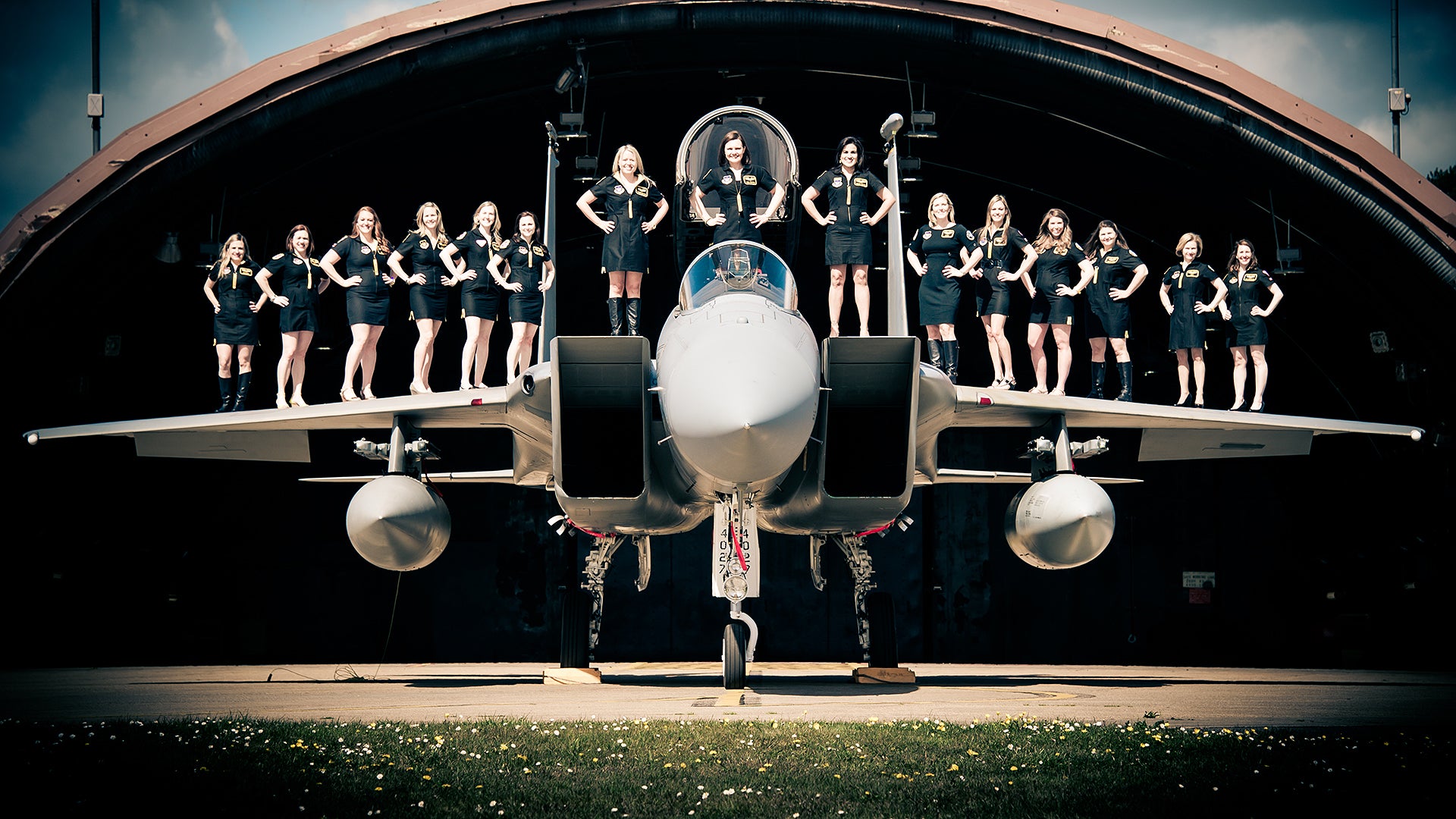Tara Stratton is the wife of Lt. Col. John C. ‘Otter’ Stratton, commanding officer of the 493rd Fighter Squadron. His unit is better known as ‘The Grim Reapers’ and you may already be familiar with ‘Otter’ – he’s the fighter jockey featured in the ‘Red Flag’ IMAX movie. Otter’s squadron of F-15C Eagles are air superiority workhorses, the point at the tip of the USAF’s spear at RAF Lakenheath in England.
We’ve all seen those cinematic moments. The scenes where the hero fighter pilot climbs out of the cockpit and their spouse runs towards them, arms outstretched, ready to be thrown around their loved one tighter than the g-pants still attached to their combat-worn flight suit.
Sitting in her husband’s empty office, Tara Stratton is a more realistic vision of a fighter pilot’s wife: A marriage of 13 years. Tours with four frontline F-15C squadrons, in three different countries. Two young kids, a son aged eight and a daughter aged five. A busy commanding officer for a husband, his four-year posting in the UK coming to an end.
How would you cope with a world constantly shifting under your feet? How would you deal with a marriage where your spouse can expect to be called away at a moment’s notice, sometimes not knowing where, when, why, or for how long. What’s the key? For Stratton, the answer is The Reaperettes: A collective of fighter pilot spouses that look out for each other, through thick and thin. A club as elite as the tight fraternity of their husbands, and one that also comes with it’s own unique dress code.

“I don’t have a better way to describe it other than that we are a family.” Stratton smiles as she defines The Reaperettes. “Typically, it’s the spouses – and that includes husbands – although since I have been here The Reaperettes have solely been made up of wives. Girlfriends are welcome to some things, like social events, but other things are very close-held for spouses-only.”
“As wives, we are ‘keepers of information. Not in terms of classified information, but we might know details that the general public doesn’t know like where they are and how long they will be gone. Also, we are the ones that are doing things for the squadron – we are the baby-meal-makers, the grocery shoppers, when you are sick, so the spouse-only events are also a thank you, for what they put into squadron life.”
“We get together a lot,” she says, laughing. “Typically we’ll try and get together once a week. We’ll ensure that there is at least one social a month, and often there are about five monthly events. It could be a lunch, a birthday, a welcome gathering for a new family, for the spouse and kids. Sometimes we’ll just get together for wine and order a pizza, or if the squadron’s on Roll Call we’ll all hang out ourselves.”
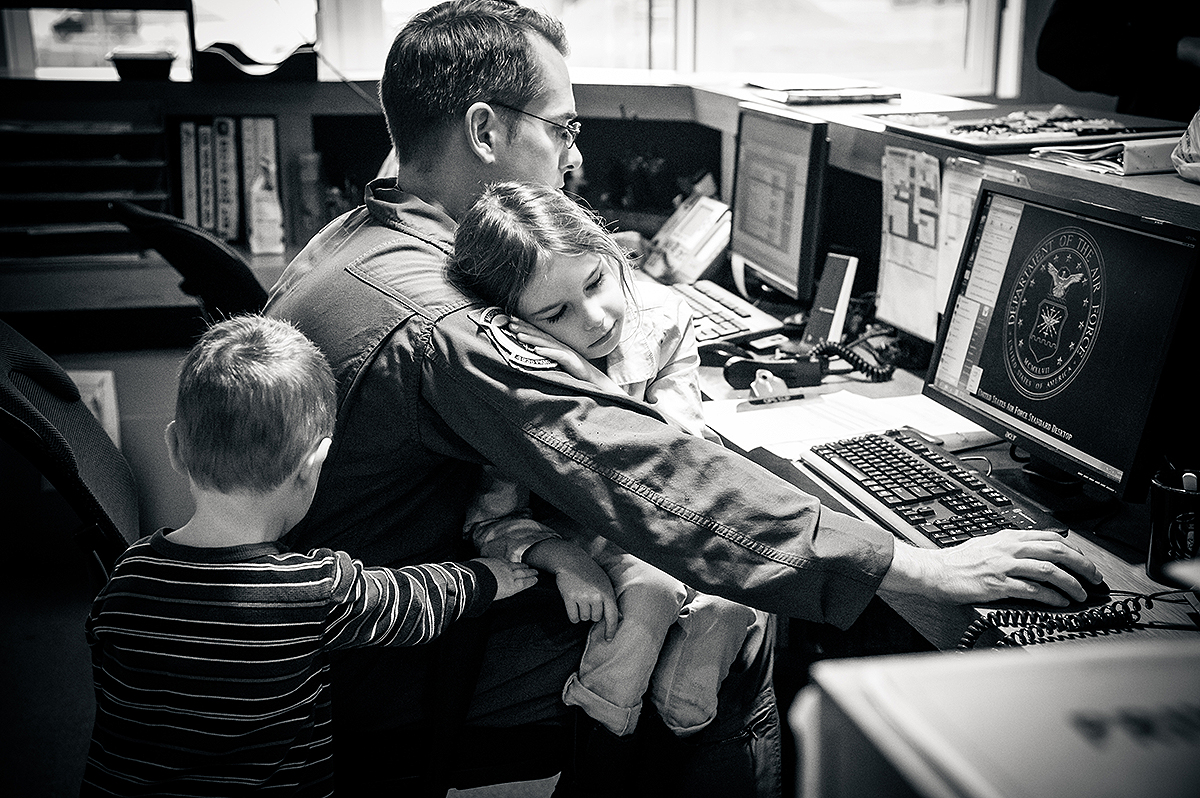
Unsurprisingly, Stratton sees the tight-knit group as more than just a social club. “I think having The Reaperettes is very comforting for our husbands when they leave. It makes it easier for them to go do what they have to do. Just to know that… we’ve got it. We’ve got it taken care of.”
Indeed, the wives have a fantastic handle on the ins and outs of squadron life. “I think if you ask most of us, we would always have a better way to run the squadron! If we were just in charge of it, we would do it this way and that way… but maybe that’s not just unique to our community!” she jokes.
Her tone changes. “Because ‘we’ve got it,’ they can perform their mission. That’s not to say that what we do doesn’t have its own set of challenges, but we are all very strong women. I think sometimes there is a danger that people can see us as less than what we are. Our Reaperettes are made up of anesthetists, physicians, geophysicists, teachers, nurses, marketing executives – in their own right they are strong women in their careers, and many of us put those aside to focus on this kind of thing. Hopefully it makes it easier for the pilots to do what they do.”
It’s a patriotic sacrifice, and an important one. “I think that it would be miserable if we didn’t have each other. It would just be a completely different assignment and a different role. I think that morale would be at an all-time low if we weren’t there for each other.”
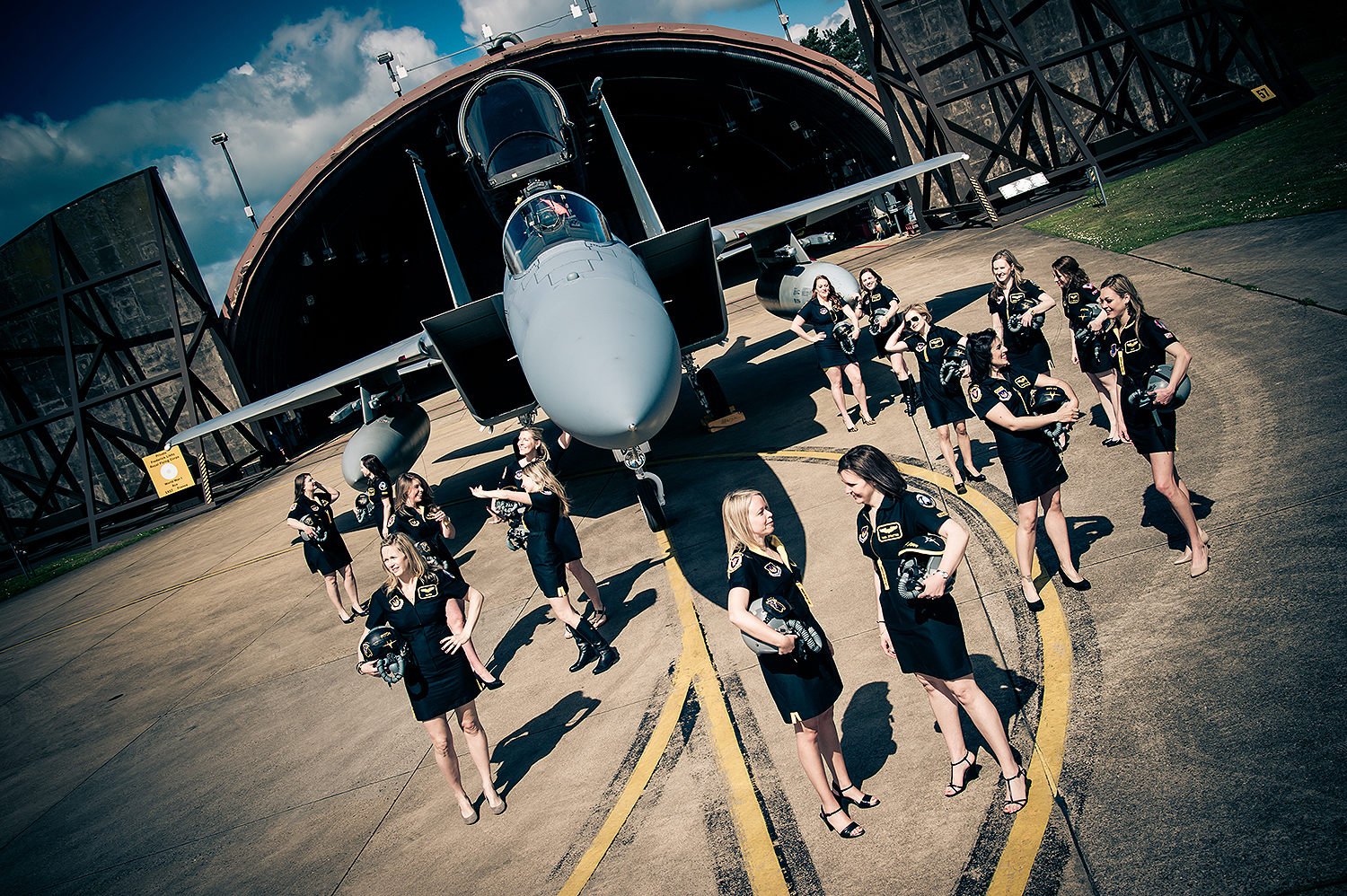
Forged by that sacrifice, the bonds of the Reaperettes only grow stronger. “They (the pilots) pick up and leave at a moment’s notice and there’s nobody that gets it like we do. There’s nobody else. Not even your family. As much as they love us, they just don’t know. There’s nobody that lives it the way each of us does. Sometimes they get tasked, one (pilot) at time, to go do something. Like, after a year of being here ‘Otter’ got tasked to go to Afghanistan for 12 months on his own. The Air Force didn’t pack us all up and ship us back to the States – this was all we had. The Reaperettes stepped up and took care of us.”
Although this set-up is common in the fighter world, Tara explains a unique element to life with the 493rd at Lakenheath. “It might be different here as the C-model is a small community. Each jet is just one pilot and there are no WSOs (Weapon System Officers) or navigators in our community, so the numbers are very different. However, the overall goals will be the same.”
“The goodbyes are hard. We don’t come in and see our jets off. Every squadron does that differently, and every commander has their own take on that. Right now, we don’t come in before a deployment — they’re busy working for the hours before they take-off, briefing etcetera. We say our goodbyes at home, and we drop them off outside and, when we hear the noise and we do, we hear it from our homes, we know that they’re off.”
“But the best part is when they come back. The homecoming is just so… amazing. It’s awesome. It’s so different to anything. To go out on the flightline when they come home and meet them is just awesome. And it’s being together through all those things that bring us closer. Everyone’s sad to see them off… Well on the longer ones at least — sometimes on the shorter ones it’s like ‘See ya!’ Thank goodness for that! But the long ones, when you don’t know when they are coming back – like three to six months, often with a big question mark – you just don’t know where they are going or when they will be back. When they are away like that, when it’s appropriate and not classified, we will get notification through the usual channels. But not all deployments are like that” Stratton explains.
Indeed, the regular pattern of deployments are one thing, but calls like the one to deploy to Turkey last year for the ongoing mission against ISIS make an already busy and unpredictable life even more complex. “You just don’t know” Stratton adds. “They could still be out there now, for all we knew when they left. On top of that, even when it’s a ‘regular’ deployment, jets break, tankers break, anything could happen. Just a couple more days… Just a couple of weeks…” She sighs.
“It’s hard when you have babies. But it’s a part of our life. For some it’s harder than others — each family and spouse is unique. It gets tough when a baby is sick and we’ll all help as much as we can, but sometimes we’ve seen families that have had to go back to the States for support.”
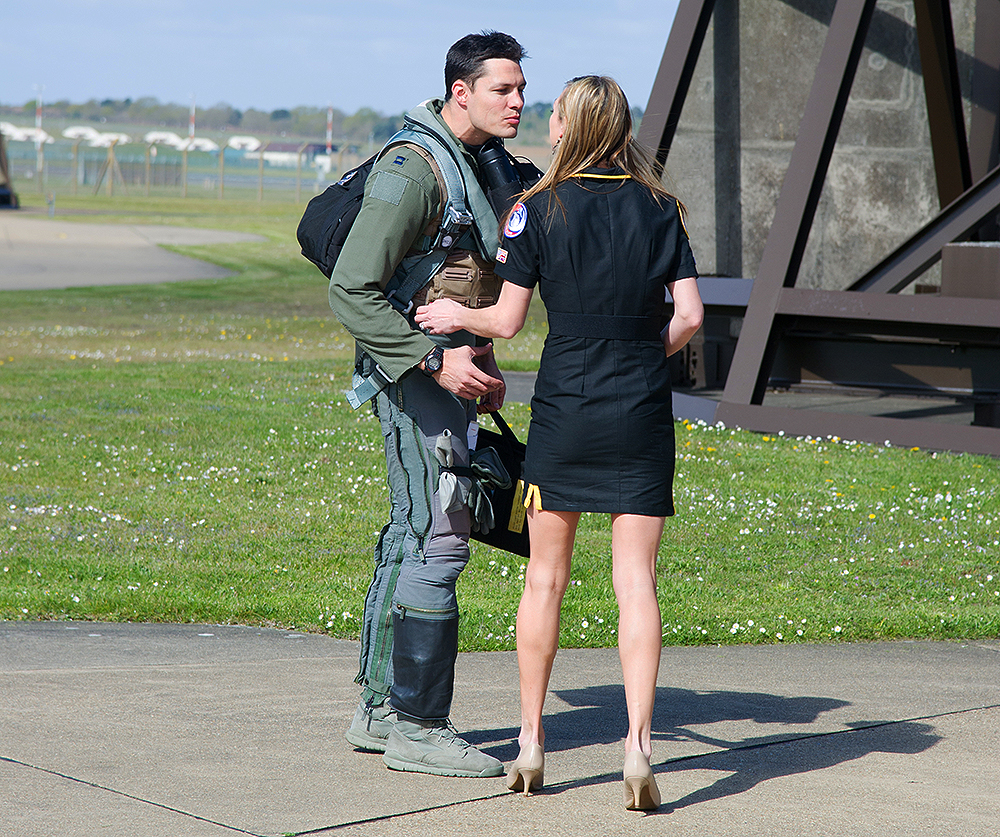
It’s clear how integral everyone is to each other’s lives. But often people are not keen on a squadron-sized group of people knowing their business. “I actually consider myself a pretty private person.” Stratton says. “But sometimes you just have to get over yourself. You know, you just need it. I feel like I have a pretty decent relationship across the Reaperettes and hope that I would know if something is going on and they are not feeling ok. If somebody that regularly turns up to things is not showing up then we may see that something is up, but Facebook is a great tool! We have our own secret group on Facebook, and that’s where a lot of communication can take place. Anything from “Hey I’m going to the Commissary does anybody need anything’ to ‘I’m really struggling with this….’”
With a group as tight knit as the Reaperettes, it could be a challenge for a new spouse to find their place. It’s a situation Stratton is keen to prevent. “When a brand-new family is due for arrival at our squadron, I will send an e-mail to the spouse about a month before they get here. Each incoming family has a sponsor family assigned to them and they will be cc’d into this mail. This will welcome them, invite them to our Facebook page where I can introduce them and they can start to make connections and ask questions — anything from what to pack to what the weather is like. The day they get in, I make a meal for the family and take it over to their temporary lodging. If ‘Otter’ is in town, he’ll come with me and we’ll take our kids too. We also do a welcome basket for them, with local information, groceries, so they are pretty much set-up as soon as they get here. After that, we will have a welcome lunch, unless there is already an event scheduled.”
“For the pilots, the only thing familiar about being posted to a new squadron is the jet. That doesn’t change for them, it’s the same cockpit in the same jet. Outside of that, people move around with the Air Force a lot, and when they do, they can just know that this welcoming ‘family’ structure will be that all important familiarity, whether you actually know the guys or not. You come into it knowing that it’s just going to be that way because that’s how we do it.”
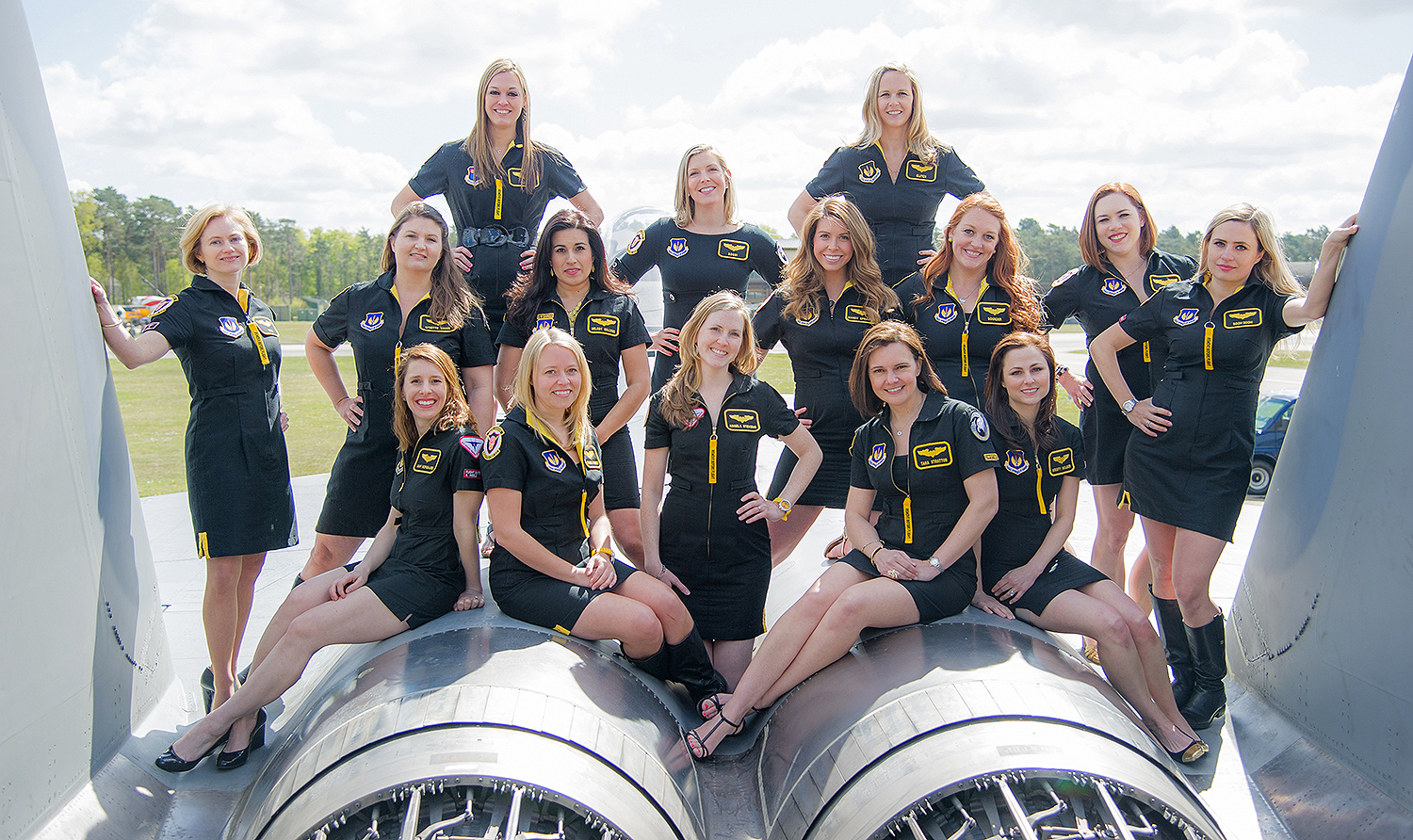
“If a female pilot arrives with a husband it would not change anything. Participating in the spouse’s group is totally voluntary, and we have some that are more pro-active than others depending on what is going on in their lives. Our very first fighter squadron had a female pilot and her husband would come to most things but if we’re going to a pedicure he’d skip that! We’ve not had that dynamic at the 493rd and if we did we’d have to rethink the name “Reaperettes” I guess! Furthermore, we also do things with our enlisted spouses the same way as we do with our pilot spouses.”
“Being here in the UK, it’s unique. Not everyone lives on base and it’s quite spread out, so it says something that everyone will make the effort to come from all over to meet up. The squadron has a great reputation and we love it. I was used to the F-15C culture, having been at Langley, Eglin and Kadena, and when I first got here, I was a little unsure what this assignment would be, but it did not disappoint.”
“There’s no real hierarchy to the set-up, it’s a natural thing that just evolves. My husband is the commander and I am his wife, but outside of that, we are peers. Whoever is in the role as the Boss’s wife can perhaps set the tone for the Reaperettes, but everybody has a role. We have someone to sign up for baby meal rotations, someone that looks after birthdays for dates and restaurants. We have two people that are known as ‘The Sunshine Gals.’ They are the ones that, when we hear you’re having a bad day, will leave a bottle of wine and a card or flowers on your doorstep. All these little things just add up to let you know that people are thinking of you, and it’s so great.”
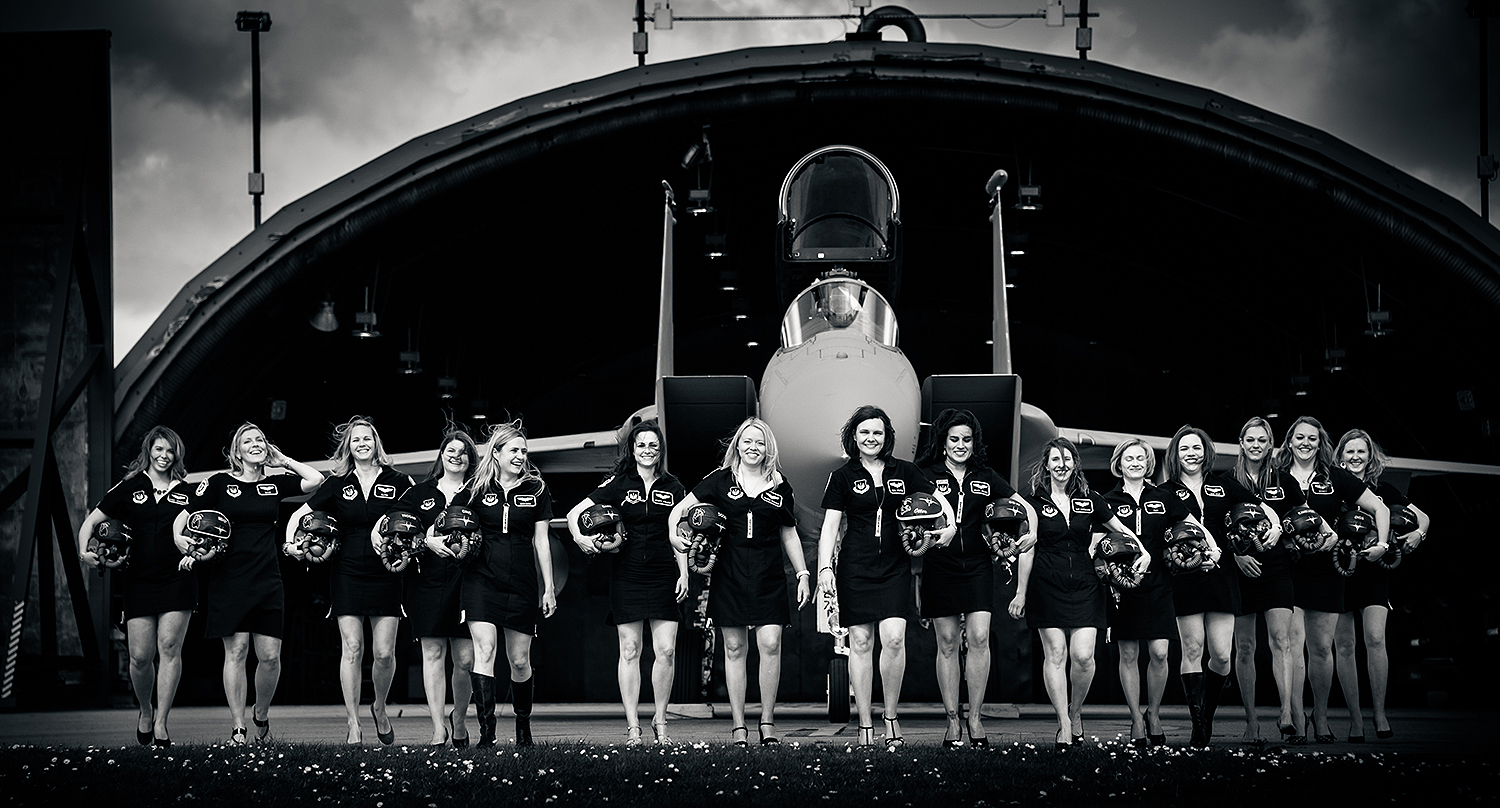
“As long as I have been around the fighter community, 13 years, this has been the way. I grew up in an Army family and I can remember my mum doing these things in their battalions. Not exactly the same, and not as close-knit, but it was similar. The whole political correctness of everything, and general culture of the military now means that they have to be much more careful in choosing their words, and things that might have been traditional in fighter squadrons 20 years ago are different now. It’s not a bad thing, it is just different. At the end of the day, we support the mission, whatever that might be, we support it. Sometimes we support it more joyfully than others, but we are part of Team Liberty, and we are a small but mighty squadron.”
“Wider than that, we support the USAF and, in terms of the biggest picture, we all have various political views, which often surprises people that we all don’t all feel the same way about things. But, putting all of that aside, I don’t think anyone always understands the politics of things and why things happen yet we support their mission by supporting what our country stands for and we support defending liberty. Whatever they have to do, we stand behind them. But whilst our role is right here, I think deep down we all feel that it does have a much bigger impact on our country and the world at the end of the day. We are all very patriotic.”
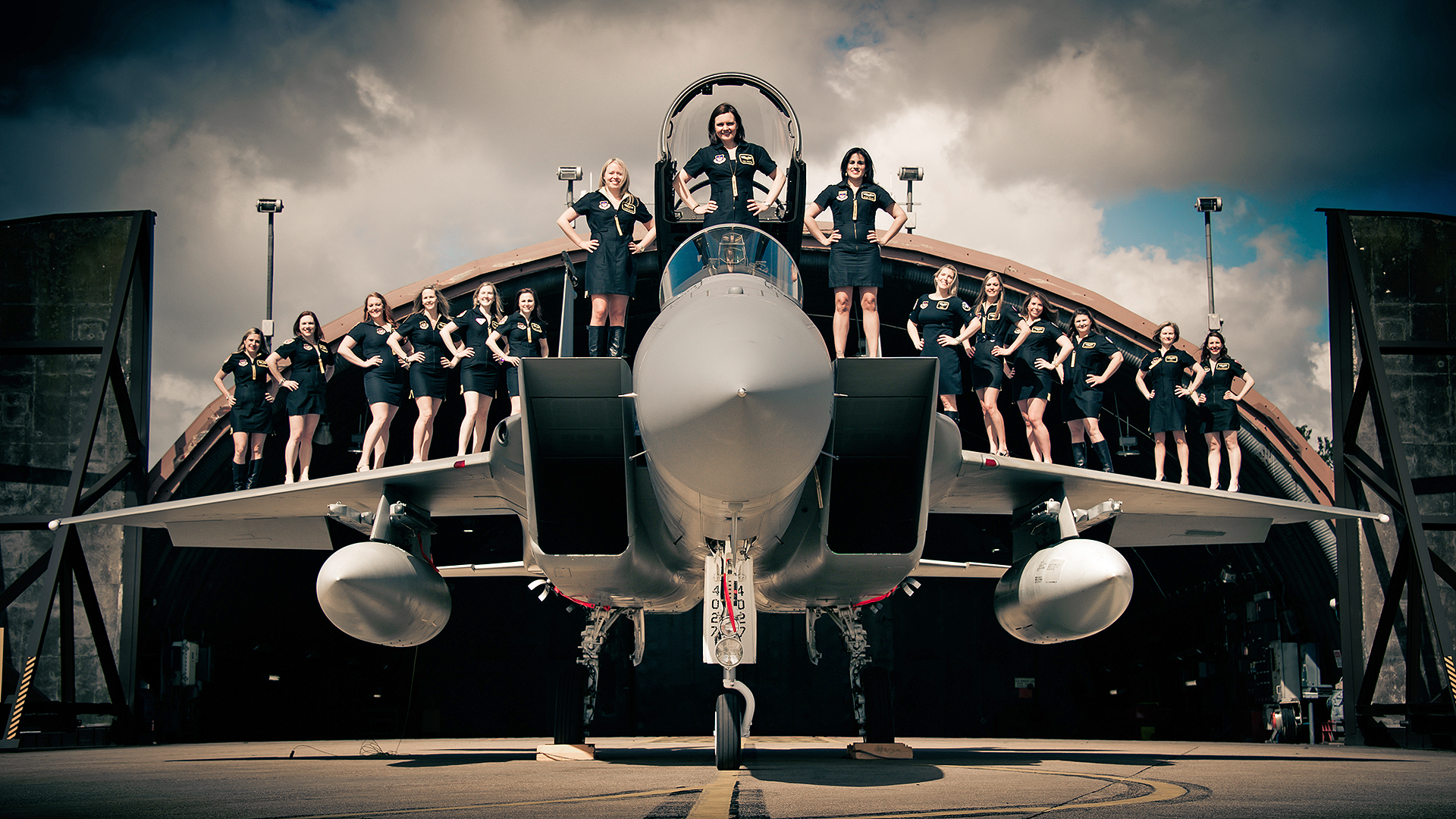
Ultimately, it’s the support that’s needed for an elite group of pilots putting themselves in danger every time they strap into the cockpit.
“It’s hard in that it’s a dangerous job that they do every day.” Stratton’s voice cracks, her strength of emotion and passion for the squadron evident. “We are all very aware of that. One of the hardest things we do — and we do it every time you get to a new squadron — is sitting down with our spouses and filling out the form that says if something happens to you, if you die, this is how I want to be informed, this is who I need to take care of our kids, this is where our kids go to school. This is where I work and these are my hours. So that if someone has to show up and tell you the, you know, unfortunate news… This is where my husband wants to be buried, this is how he wants his parents told… All of it. That’s a hard document to fill out. It hits home. But, at the end of that, there is some joy to be found. You know that it is taken care of, and there is comfort in that. There’re not many people that have those conversations and get those plans in place.”
“Bringing the Reaperettes into that; they’ve all done that form, they’ve all lived those deployments. And we’ve all got each other. And the best things? Regardless of political standing, we are all very patriotic and besides, our husbands have a really cool job!” Tara jokes. “I never get tired of the jet noise. I am never outside, when hearing the jets flying, and don’t stop to look… It’s just cool, and I don’t even like flying! We get to see the world. We get to live in places that people won’t even get to vacation.”
“If I could go back to my High School days, growing up in an Army family — I swore I would never date anyone in the military and now here I am.” Stratton recalls, adding, with gentle sincerity “But it’s a good life, a really good life. I feel like we are taken care of. I wouldn’t change a thing — even the worst years. It’s busy and there are a thousand things you could name to not like, but it has been good to us because we have chosen to make it good for us and our family. My children love coming into the squadron, it never gets old to them. They come and sit out on the porch and watch the jets and they think it’s pretty cool.”
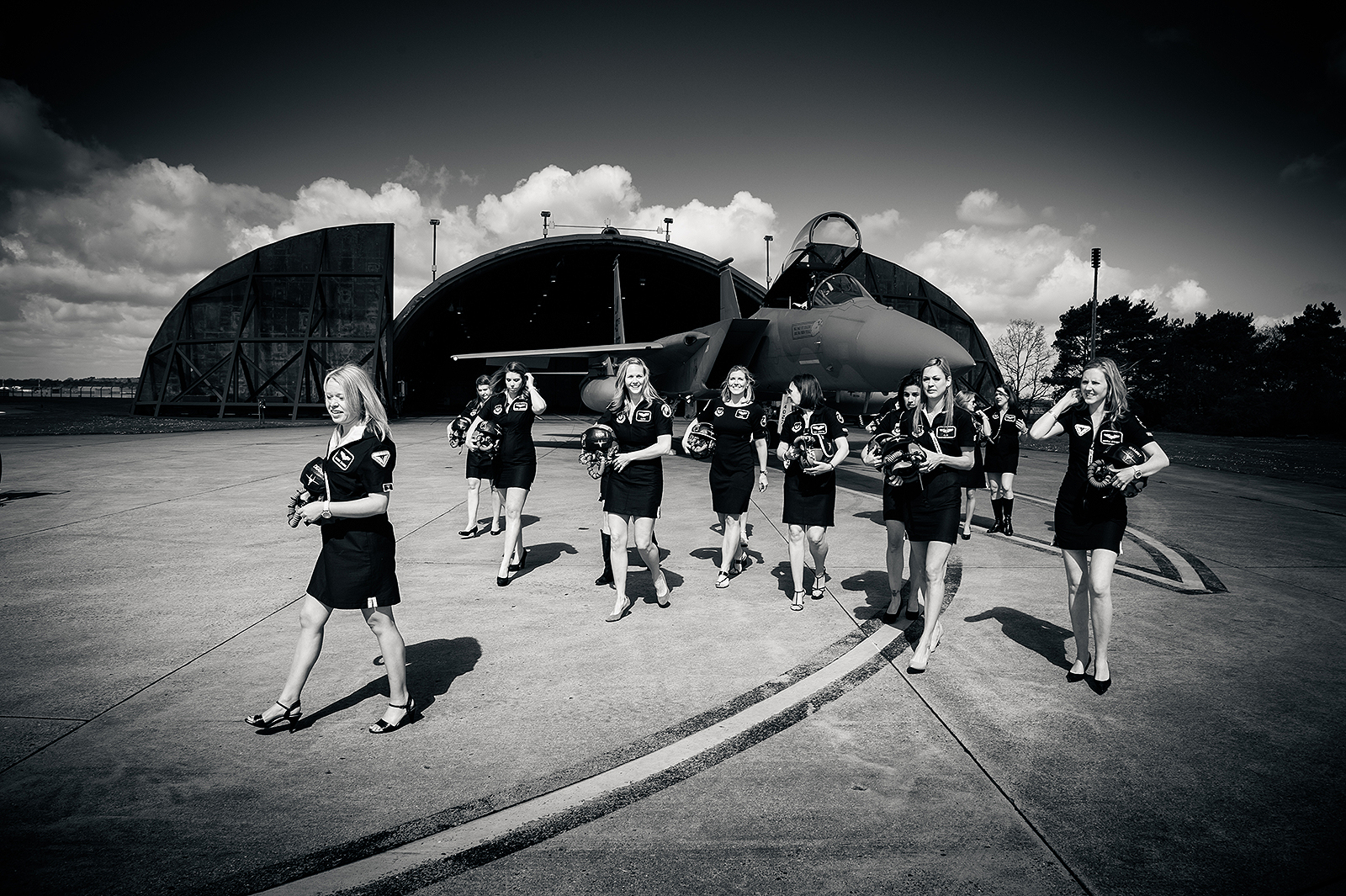
Stratton did not want to sign off without a nod to another asset vital to the Grim Reapers. “We also do an appreciation event for the maintainers, which is a fun cookie drive at Christmas. At the end for the day we all know, in fact we are very aware, that our husbands’ lives rest in their hands every single day, as well as the guys in the Aircrew Flight Equipment department, packing their chutes, maintaining their helmets and oxygen masks. Although they are not wearing the black Reaperette dress, they are a part of this network that we talk about and their spouses are often away longer than ours. They are all very much a part of the family.”
Though there’s plenty of sacrifice to go around, Tara makes it clear just how important being a Reaperette really is: “The standing joke within the squadron is that the guys always say ‘When I die I want to come back as a fighter pilot’s wife!’”
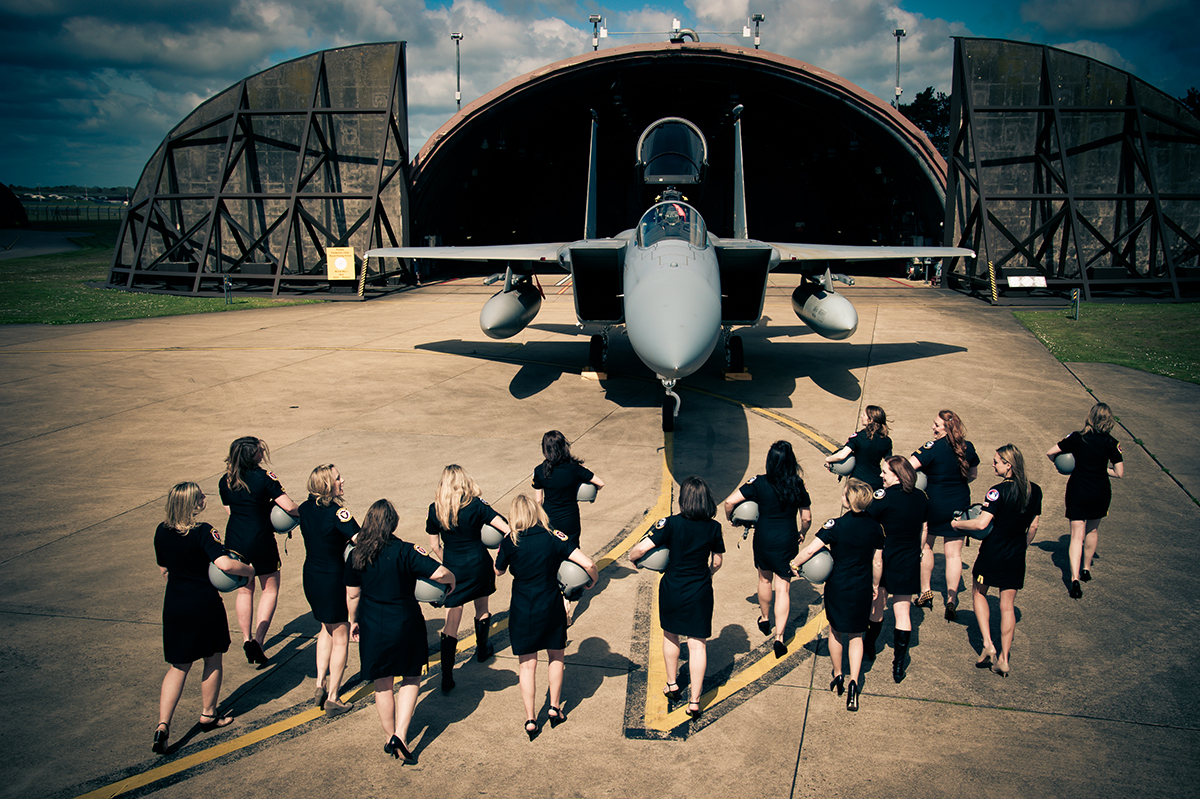
Rich Cooper runs the Centre Of Aviation Photography make sure to check them out here and to follow him on Facebook here.
Contact the editor of The War Zone Tyler@thedrive.com
